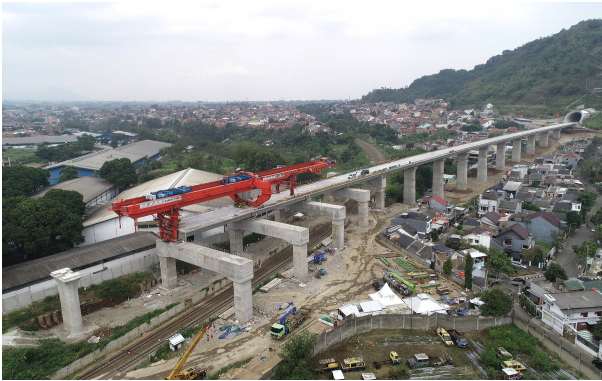BRI cooperation driving global economic recovery

An aerial photo of the construction site of Jakarta-Bandung High Speed Railway in Indonesia, on Aug. 22, 2021. [Photo/Xinhua]
Given the COVID-19 pandemic, humanity is facing a daunting challenge to ensure security and economic development. Against this backdrop, the Belt and Road Initiative (BRI) has showcased its resilience and vitality, playing an important role in assisting the participating countries to fight COVID-19 and stabilize their economies.
The BRI, since it was proposed in 2013, has developed into the world's largest platform for international cooperation. Over the past eight years, 140 countries have signed cooperative agreements with China. In June 2020, China pledged to build the BRI into a model of health for protecting people's safety and well-being, a model of recovery for restoring economic and social activity, and a model of growth for unlocking development potential. In this regard, BRI international cooperation is expected to play a more crucial role in addressing global crises and achieving long-term progress.
The COVID-19 pandemic has once again reminded us that all countries are intricately interconnected and interdependent. Working together is the only way out when it comes to either containing the virus or restoring the economy. In this case, under the framework of the BRI, countries have stepped up their efforts to promote policy synergies and boost trade, in order to overcome the negative impacts brought about by the pandemic in terms of finance, taxation, energy and environmental protection. Such endeavors have accordingly conveyed confidence to the international community and made vital contributions to the global economic recovery.
China has been working with other countries to jointly contain the virus by providing them with medical materials and sharing experience. It has tried its best to provide over 700 million doses of COVID-19 vaccines to more than 90 countries. In June, China and 28 countries jointly launched the Initiative for Belt and Road Partnership on COVID-19 Vaccines Cooperation, in order to ensure the accessibility and affordability of COVID-19 vaccines in BRI countries and other developing countries.
Currently, the key lies in containing the virus efficiently and resuming production, so as to ensure that people's lives can get back to normal as soon as possible. Despite the headwinds, a lot of BRI cooperation projects, following strict pandemic prevention and control measures, have continued to proceed without layoffs, and some new BRI projects have even been launched. In this regard, international cooperation under the framework of the BRI has served as a shield for many countries and regions during the pandemic. Such cooperation is expected to play an even more important role in establishing more stable supply chains, industrial and value chains in the days to come.
The pandemic, on the other hand, is actually driving economic transformation. In this case, the "digital economy" and "green development" will probably serve as new drivers to ensure BRI cooperation moves forward in a sustainable manner. China has attached great importance to the development of the digital economy and green growth. In this regard, a lot of countries have seized opportunities to cooperate with China in areas such as digital industry, green infrastructure, clean energy and green finance, so as to better tap their growth potential and contribute to global economic growth.
China has entered a new development era while achieving its first centenary goal – to build a moderately prosperous society in all respects, and its market will only open wider to the world. More opportunities are expected to be there for countries to conduct pragmatic cooperation, and more people will benefit from China's outlook of high-quality BRI cooperation that aims to build a closer partnership for cooperation in health, connectivity, green development, openness and inclusiveness.


